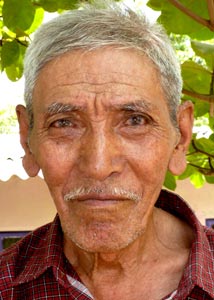Name: Tinlay Dhondup
(Alias: No)
Gender: Male
Interview Age: 78
Date of Birth: 1932
Birthplace: Lhopra, Utsang, Tibet
Year Left Tibet: 1959
Profession: Farming
Monk/Nun: No
Political Prisoner: No

Interview No.: 52M
Date: 2010-04-06
Language: Tibetan
Location: Doeguling Settlement, Mundgod, Karnataka, India
Categories: Oppression and Imprisonment
Keywords: childhood memories, Chinese -- first appearance of, Chinese -- oppression under, Chinese rule -- life under, pilgrimage, thamzing/struggle sessions, Utsang
Summary:
Tinlay Dhondup's began grazing animals at the age of 8 and working in the fields from the age of 11 years. His village followed the system of lakhor, which is work performed jointly by all the people in turns. Tinlay Dhondup recalls his experience of going on pilgrimage to Lhasa in 1946 and in 1950. He visited the holy shrines and the great monasteries. He is overwhelmed by shops in the Bakor, central market square, and caught a glimpse of His Holiness the Dalai Lama for the first time during the Monlam 'Prayer Festival.' He speaks of the raka who collected fees from recent arrivals for the disposal of corpses of people who were visiting and died while in Lhasa.
Tinlay Dhondup first saw Chinese in Lhasa who were civilians engaged in running restaurants in Lhasa, and on his second visit he now saw soldiers constructing houses. He tells of an encounter in Tsethang between the Chinese and the Tibetan soldiers. Tinlay Dhondup describes how the poor people of his village were trained by the Chinese to conduct thamzing 'struggle sessions.' He then witnessed three rich and influential people being subjected to thamzing by the trainees.
Interview Team:
- Rebecca Novick (Interviewer)
- Ronny Novick (Videographer)
- Namgyal Tsering (Interpreter)

